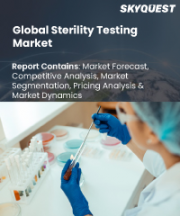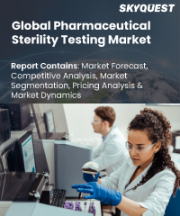
|
시장보고서
상품코드
1517576
무균 시험 시장 : 제품별, 검사별, 유형별, 용도별, 최종 사용자별 - 세계 예측Sterility Testing Market - By Product, Test, Type, Application, End-user, Global Forecast |
||||||
무균 시험 시장은 만성질환 유병률 증가에 힘입어 2024-2032년간 연평균 10.6%의 성장률을 나타낼 것으로 전망됩니다.
WHO에 따르면, 현재 추세대로라면 심혈관 질환, 암, 당뇨병, 호흡기 질환 등 비감염성 질환(NCDs)이 2050년까지 연간 사망자 9,000만 명 중 86%를 차지할 것으로 예상되며, 이는 2019년 대비 90% 증가할 것으로 예측됩니다. 전 세계적으로 만성질환에 대한 부담이 증가함에 따라 효과적인 의약품 치료제와 생물학적 제제에 대한 수요가 증가하고 있습니다. 이러한 의약품의 안전성과 유효성을 보장하기 위해 엄격한 무균 시험가 이루어지고 있습니다.
만성 질환을 관리하기 위해 주사제, 임플란트 및 기타 무균 의료기기가 사용되는 경우가 많으며, 엄격한 무균 시험를 거쳐야 합니다. 이에 따라 만성 질환을 관리하기 위한 안전하고 신뢰할 수 있는 의료 솔루션에 대한 수요가 증가하면서 시장 확대의 원동력이 되고 있습니다.
또한, 검사 시간 단축에 대한 관심도 높아지고 있습니다. 무균 시험 프로세스를 간소화하고 오염 물질을 신속하게 감지하고 제품을 신속하게 상용화할 수 있도록 신속한 미생물학적 방법과 자동화된 검사 시스템의 채택이 증가하고 있습니다. 이는 향후 몇 년동안 시장 전망을 강화할 것으로 예상됩니다.
무균 시험 시장은 검사, 유형, 용도, 최종 용도, 제품 및 지역별로 분류됩니다.
많은 제약 및 생명공학 기업들이 무균 시험 요건을 전문 서비스 제공업체에 위탁하고 있어 서비스 분야는 예측 기간 동안 급성장할 것으로 보입니다. 이러한 서비스 제공업체는 일상적인 무균 시험, 시험법 개발 및 검증, 환경 모니터링, 미생물 테스트 등 다양한 테스트 서비스를 제공합니다. 이러한 서비스를 아웃소싱함으로써 기업은 전문 시험소의 전문성과 첨단 장비를 활용하여 운영 비용과 납기를 줄이면서 규제 표준을 준수할 수 있습니다.
직접 접종 테스트 분야는 주사제, 점안제 및 기타 비경구 제제를 포함한 다양한 제품을 테스트할 수 있는 편의성과 능력으로 인해 2032년까지 견인력을 높일 것으로 예상됩니다. 이 방법은 호기성 및 혐기성 미생물을 모두 검출하는 데 매우 효과적이며 종합적인 무균성 평가를 보장합니다. 이 방법은 점성 시료나 미립자가 포함된 시료와 같이 막 여과가 불가능한 시나리오에서 매우 중요합니다. 직접 접종의 채택은 신뢰성, 사용 편의성 및 규제 지침 준수에 의해 추진되고 있습니다.
아시아태평양의 무균 시험 산업은 중국, 인도, 일본, 한국 및 기타 국가의 제약 및 생명공학 분야의 급격한 성장에 힘입어 2032년까지 양호한 성장세를 보일 것으로 예상됩니다. 이 지역에서는 헬스케어 인프라에 대한 투자가 증가하고 있으며, 고품질 의료 제품에 대한 수요 증가와 함께 엄격한 무균 시험에 대한 필요성이 증가하고 있습니다. 또한, 생명과학 분야의 발전을 지원하는 정부의 적극적인 노력과 정책은 시장 성장을 위한 환경을 조성하고 있습니다.
목차
제1장 조사 방법과 조사 범위
제2장 주요 요약
제3장 업계 인사이트
- 생태계 분석
- 업계에 대한 영향요인
- 성장 촉진요인
- 업계의 잠재적 리스크&과제
- 성장 가능성 분석
- 규제 상황
- Porter's Five Forces 분석
- PESTEL 분석
제4장 경쟁 구도
- 서론
- 기업 매트릭스 분석
- 주요 시장 기업 - 경쟁 분석
- 경쟁 포지셔닝 매트릭스
- 전략 대시보드
제5장 시장 추산·예측 : 제품별, 2021-2032년
- 주요 동향
- 키트 및 시약
- 서비스
- 검사기기
제6장 시장 추산·예측 : 검사별, 2021-2032년
- 주요 동향
- 막여과
- 직접 접종법
- 신속 미생물법
- ATP 생물 발광
- 형광 기반
- 고체상 세포 분석
- 기타 신속 미생물법
- 기타 검사
제7장 시장 추산·예측 : 유형별, 2021-2032년
- 주요 동향
- 사내
- 외부 위탁
제8장 시장 추산·예측 : 용도별, 2021-2032년
- 주요 동향
- 의약품 및 바이오 제조
- 의료기기 제조
- 기타 용도
제9장 시장 추산·예측 : 최종사용자별, 2021-2032년
- 주요 동향
- 제약 기업 및 바이오테크놀러지 기업
- 의료기기 제조업체
- CRO 및 시험 수탁 기관
- 기타 최종사용자
제10장 시장 추산·예측 : 지역별, 2021-2032년
- 주요 동향
- 북미
- 미국
- 캐나다
- 유럽
- 독일
- 영국
- 프랑스
- 스페인
- 이탈리아
- 기타 유럽
- 아시아태평양
- 중국
- 일본
- 인도
- 호주
- 기타 아시아태평양
- 라틴아메리카
- 브라질
- 멕시코
- 기타 라틴아메리카
- 중동 및 아프리카
- 남아프리카공화국
- 사우디아라비아
- 기타 중동 및 아프리카
제11장 기업 개요
- bioMerieux SA
- Charles River Laboratories International Inc.
- Merck KGaA
- Nelson Laboratories, LLC
- Pacific Biolabs
- Rapid Micro Biosystems Inc.
- Sartorius AG
- SGS SA
- Thermo Fisher Scientific Inc.
- WuXi AppTec
The Sterility Testing Market is poised to record a CAGR of 10.6% during 2024-2032, driven by the rising prevalence of chronic diseases. According to WHO, if current trends persist, non-communicable diseases (NCDs) like cardiovascular diseases, cancer, diabetes, and respiratory illnesses could constitute 86% of the projected 90 million annual deaths by 2050, marking a 90% increase from 2019. As the global burden of chronic illnesses continues to escalate, there is an increasing demand for effective pharmaceutical treatments and biologics. The rigorous sterility testing to ensure the safety and efficacy of these medical products.
Chronic disease management often involves the use of injectable drugs, implants, and other sterile medical devices, all of which require stringent sterility testing. Consequently, the growing need for safe and reliable medical solutions to address chronic diseases is driving market expansion.
Further, there is focus on reducing testing turnaround times. Rapid microbiological methods and automated testing systems are increasingly being adopted to streamline the sterility testing process, enabling quicker detection of contaminants and faster commercialization of products. This will bolster the market outlook in the coming years.
The sterility testing market is classified based on test, type, application, end-use, product, and region.
The services segment will grow rapidly over the forecast period, as many pharmaceutical and biotechnology companies outsource their sterility testing requirements to specialized service providers. These providers offer a range of testing services, including routine sterility testing, method development & validation, environmental monitoring, and microbiological testing. Outsourcing these services allows companies to leverage the expertise and advanced facilities of specialized laboratories, ensuring compliance with regulatory standards while reducing operational costs and turnaround times.
The direct inoculation test segment will gain traction through 2032, owing to its simplicity and ability to test a variety of products, including injectable drugs, ophthalmic solutions, and other parenteral preparations. The method is highly effective for detecting both aerobic and anaerobic microorganisms, ensuring comprehensive sterility assessment. Its application is critical in scenarios where membrane filtration is not feasible, such as with viscous or particulate-containing samples. The adoption of direct inoculation is driven by its reliability, ease of use, and compliance with regulatory guidelines.
Asia Pacific sterility testing industry will grow at a decent pace through 2032, driven by the rapid growth of the pharmaceutical and biotechnology sectors in countries like China, India, Japan, and South Korea. The region's increasing investment in healthcare infrastructure, coupled with the rising demand for high-quality medical products, is propelling the need for rigorous sterility testing. Moreover, favorable government initiatives and policies supporting the development of the life sciences sector are creating a conducive environment for market growth.
Table of Contents
Chapter 1 Methodology & Scope
- 1.1 Market scope & definitions
- 1.2 Research design
- 1.2.1 Research approach
- 1.2.2 Data collection methods
- 1.3 Base estimates & calculations
- 1.3.1 Base year calculation
- 1.3.2 Key trends for market estimation
- 1.4 Forecast model
- 1.5 Primary research and validation
- 1.5.1 Primary sources
- 1.5.2 Data mining sources
Chapter 2 Executive Summary
- 2.1 Industry 360 degree synopsis
Chapter 3 Industry Insights
- 3.1 Industry ecosystem analysis
- 3.2 Industry impact forces
- 3.2.1 Growth drivers
- 3.2.1.1 Increasing demand for biopharmaceuticals
- 3.2.1.2 Increasing outsourcing of sterility testing services
- 3.2.1.3 Technological advancements in sterility testing
- 3.2.2 Industry pitfalls & challenges
- 3.2.2.1 Time-consuming testing process
- 3.2.2.2 Complex regulatory framework
- 3.2.1 Growth drivers
- 3.3 Growth potential analysis
- 3.4 Regulatory landscape
- 3.5 Porter's analysis
- 3.6 PESTEL analysis
Chapter 4 Competitive Landscape, 2023
- 4.1 Introduction
- 4.2 Company matrix analysis
- 4.3 Competitive analysis of major market players
- 4.4 Competitive positioning matrix
- 4.5 Strategy dashboard
Chapter 5 Market Estimates and Forecast, By Product, 2021 - 2032 ($ Million)
- 5.1 Key trends
- 5.2 Kits & reagents
- 5.3 Services
- 5.4 Instruments
Chapter 6 Market Estimates and Forecast, By Test, 2021 - 2032 ($ Million)
- 6.1 Key trends
- 6.2 Membrane filtration
- 6.3 Direct inoculation
- 6.4 Rapid microbial method
- 6.4.1 ATP bioluminescence
- 6.4.2 Fluorescent -based
- 6.4.3 Solid-phase cytometry
- 6.4.4 Other rapid microbial methods
- 6.5 Other tests
Chapter 7 Market Estimates and Forecast, By Type, 2021 - 2032 ($ Million)
- 7.1 Key trends
- 7.2 In-house
- 7.3 Outsourced
Chapter 8 Market Estimates and Forecast, By Application, 2021 - 2032 ($ Million)
- 8.1 Key trends
- 8.2 Pharmaceutical and biological manufacturing
- 8.3 Medical devices manufacturing
- 8.4 Other applications
Chapter 9 Market Estimates and Forecast, By End-User, 2021 - 2032 ($ Million)
- 9.1 Key trends
- 9.2 Pharmaceutical & biotechnology companies
- 9.3 Medical device companies
- 9.4 CROs and contract testing laboratories
- 9.5 Other end-users
Chapter 10 Market Estimates and Forecast, By Region, 2021 - 2032 ($ Mn)
- 10.1 Key trends
- 10.2 North America
- 10.2.1 U.S.
- 10.2.2 Canada
- 10.3 Europe
- 10.3.1 Germany
- 10.3.2 UK
- 10.3.3 France
- 10.3.4 Spain
- 10.3.5 Italy
- 10.3.6 Rest of Europe
- 10.4 Asia Pacific
- 10.4.1 China
- 10.4.2 Japan
- 10.4.3 India
- 10.4.4 Australia
- 10.4.5 Rest of Asia Pacific
- 10.5 Latin America
- 10.5.1 Brazil
- 10.5.2 Mexico
- 10.5.3 Rest of Latin America
- 10.6 Middle East and Africa
- 10.6.1 South Africa
- 10.6.2 Saudi Arabia
- 10.6.3 Rest of Middle East and Africa
Chapter 11 Company Profiles
- 11.1 bioMerieux SA
- 11.2 Charles River Laboratories International Inc.
- 11.3 Merck KGaA
- 11.4 Nelson Laboratories, LLC
- 11.5 Pacific Biolabs
- 11.6 Rapid Micro Biosystems Inc.
- 11.7 Sartorius AG
- 11.8 SGS SA
- 11.9 Thermo Fisher Scientific Inc.
- 11.10 WuXi AppTec



















